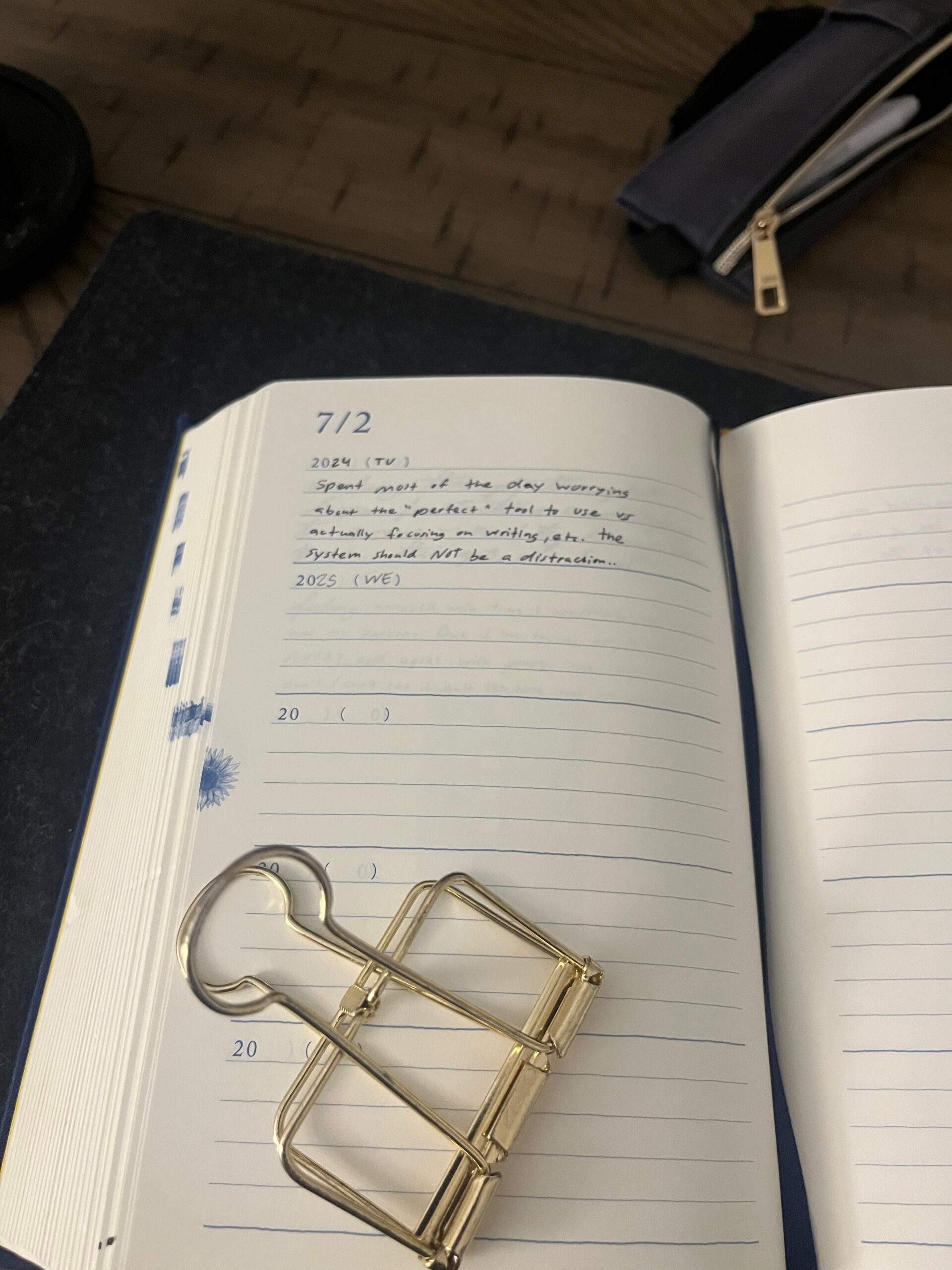Writing Consistently Within Constraints
It sometimes feels temporally impossible to maintian a writing practice, priotize focused work, and maintain my sleep health. The past month has felt especially challenging with regards to time.
On top of the typical responsibilities, I am doing the work to live in a physical and mental space that is cared for and comfortable. I am journaling, running long distances, doing the laundry, cleaning my apartment, and organizing my physical and digital files. And, for now, I have the privilege to make these non-negotiable aspects of my life.
Writing is what happens in the in-betweens — that’s what people tell me.
And, to a certain extent, this is true. I write on airplanes, in hotel rooms, and at the laundromat (which is where I wrote most of this). I get my best story ideas from natural observations and conversations, reimagined. Writing tools don’t give me the content, only the medium.
Many Sunday mornings, my goal is to focus on writing. Oftentimes, it feels blissful, but with weekday travel and weekend coursework, writing becomes another time challenge. Some Sundays, I spend a lot time feeling frustrated for not having written nearly as much as I had planned during the week. I’m trying to get passed the mental state of always feeling behind, and one method I’m using is to focus less on imaginary, needed items for my work and focus more on the practice of writing.
I’ve struggled with this for a while. According to my records, for at least one year, I have ruminated on the perfect set of writing tools.

This is an entry from my 10-year diary on July 2nd, 2024 (one year ago from this post date) on the “perfect” set of writing tools.
In Choke, Chuck Palaniuk validates the power of imagination.
“The unreal is more perfect than the real. Because nothing is as perfect as you can imagine it…Because it’s only intangible ideas, concepts, beliefs, fantasies that last. Stone crumbles. Wood rots. People, well, they die. But things as fragile as a thought, a dream, a legend, they can go on and on.”
My first therapist warned me against holding onto illusions, idealized manifestations of things or people. Our imaginations can create perfect iterations of a tool, process, or practice, potentially stymying our ability to act. I don’t think this problem is uncommon, especially not amongst people who maintain a writing practice.
In Rachel Aviv’s book, Strangers to Ourselves: Unsettled Minds and The Stories That Make Us, one of the profiles really gripped me. Ray was writing a memoir, revising it for over thirty years, and sitting with countess drafts, he died with the book unfinished. In a way, he died questioning himself, unresolved.
My issues don’t fall within the same category as Ray’s, but I also struggle with finishing my personal projects. Writing tools and productivity tools, they are often pleasant distractions. They are fun problems. Hugh MacLeod calls these “pillars” in Ignore Everybody and 39 Other Keys to Creativity.
Successful people, artists and nonartists alike, are very good at spotting pillars. They’re very good at doing without them. Even more important, once they’ve spotted a pillar, they’re very good at quickly getting rid of it.
I think about my favorite authors and realize that where I write, the space in which my words go on a page, and thinking about the theoretical best place to put those words, is a colossal waste of my limited time. I’m listening to Langston Hughes’ collection of short stories in the book, The Ways of White Folks. This collection is beautifully written but not what I normally read. Most of what I read for leisure is lighthearted because my life is dramatic enough. It already feels like a bit of a tragedy (sometimes). But, I really enjoy Hughes’ comedic work. I laugh while reading stories about Simple, reading Simple’s gripes about the very real challenges of his life. Somehow, Hughes found a way to make it funny while not ignoring the seriousness of the problems in Simple’s life. And I realize that wasting time thinking about where to write is something that Langston Hughes, a prolific writer with diverse talent, almost certainly could have not done.
I am no Langston Hughes, but I enjoy writing. I like to think that I take my writing seriously, and any serious writer spends her time writing, not obsessing over where to write or what to use, but what to write, how to write, and how her readers will perceive her writing. Any serious writer knows that it is more important to get an idea down instead of obsessing over where to put it. Wait too long, and we lose the words.
To avoid these distractions, I’m still challenging myself to a low spend year. I’m trying to use the resources that are available to me and focus on my writing practice and writing rituals.
I’m focusing on the rhythm of the keys, the Click Clack simulation of mechanical keyboard clicks in my Obsidian writing vault. I’m focusing on the scratchy sound of my fine-tipped pen on roughly textured paper. I’m finding the rhythm of my writing within the constraints of that which I already have, focusing on my prose, method, and message. This is giving me an undervalued skill that I didn’t realize I needed — I can write on a consistent basis nearly anywhere, anytime.
- I’d love to hear from you. Chat with me directly and send feedback, questions, or article requests to my new email thoughts at emilyhokett.blog.
- Find more of my writing on Substack, Medium and here at emilyhokett.blog.
- Buy me a tea🍵 to support the maintenance of the blog.